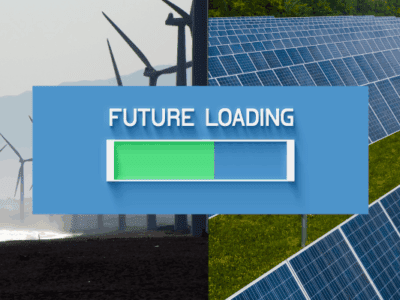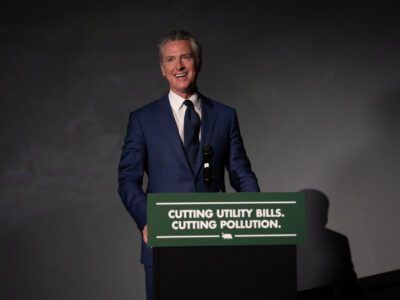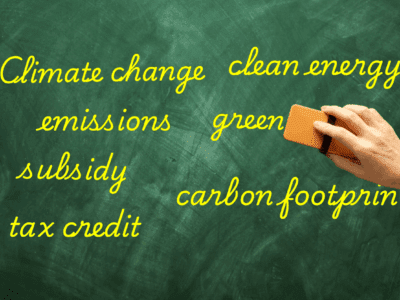More Idiocy from the Wall Street Journal Op-ed Page

A few years ago, a friend of mine suggested starting a blog entitled something like, “Why The Wall Street Journal Editorial Page Was Idiotic Today.” You’d never run out of material for posts!
Certainly that was the case today, as Senator Lamar Alexander and Representative Mike Pompeo, both Republicans, make a case against the wind energy tax credit. Essentially, their argument is that the credit is tantamount to “negative energy pricing,” which in their parlance means that wind producers get paid whether or not there is a specific demand for the energy at the time that it is produced.
This is a horrible policy, the legislators argue:
The Obama administration and other advocates of wind power argue that the subsidy provided by the tax credit allows the wind industry to sustain American jobs. But they are jobs that exist only because of the subsidy. Keeping a weak technology alive that can’t make it on its own won’t create nearly as many jobs as the private sector could create if it had the kind of low-cost, reliable, clean electricity that wind power simply can’t generate.
While the cost of renewable energy has declined over the years, it is still far more expensive than conventional sources. And even the administration’s secretary of energy, Steven Chu, calls wind “a mature technology,” which should mean it is sufficiently advanced to compete in a free market without government subsidies. If wind power cannot compete on its own after 20 years without costly special privileges, it never will.
This is a little bit rich, even for Republican members of Congress. The idea that nuclear and coal power companies have any standing to complain about subsidies for other energy sources doesn’t pass the laugh test. Both sources are massively subsidized by the federal government — they swamp anything that wind receives. As Sean noted last year, for example, the nuclear power industry faces virtually no exposure for any accident risks because of federal legislation. And the petroleum industry also benefits from overwhelming federal largesse.

As Monty Hall would say, Let’s Make A Deal: why don’t we tally up all the subsidies that oil, coal, and nuclear get versus what wind gets, and see who benefits more? Alexander and Pompeo cite to a study from the “NorthBridge Group”, castigating the wind energy credit. But of course they provide no link to it: even a cursory glance at the report reveals that it only looks at the wind credit and ignores the subsidy regime that underlies US power production in every other sector.
Moreover, all this fails to account for the greenhouse gas emissions produced by fossil fuels. Now, I’ll make a deal with Senator Alexander and Congressman Pompeo: put a price on carbon, and then we can get rid of the wind energy credit. Somehow I don’t think that they will take me up on that, because climate denial has become an article of faith for the Republican Party: the first time that denial of basic science has been a pillar of an American political party’s ideological creed.
Of course, if Alexander and Pompeo are so concerned about subsidies, I can think of a few: subsidies for sugar, which Alexander voted to keep. Or how about the vote on limiting farm subsidies to people earning less than $750,000? Alexander opposed that, too.
If I were a particularly cynical sort, I might suspect that Alexander and Pompeo, both of whom represent states that have substantial corn production, which helps produce ethanol, were attacking the wind subsidy simply because less wind power might mean more business for, say, ethanol power.
Sometimes I think these people aren’t even trying anymore…
Reader Comments
8 Replies to “More Idiocy from the Wall Street Journal Op-ed Page”
Comments are closed.







I agree that subsidies to coal dwarf those to wind energy, and these people are idiotic, but they have an agenda we’re well familiar with. However, wind energy that is subsidized by utility ratepayers who don’t have wind energy is not right. The cost shifts to utility ratepayers is very large, at least in California, and growing, and totally inequitable. Just wanted to make that clarification.
I agree that subsidies to coal dwarf those to wind energy, and these people are idiotic, but they have an agenda we’re well familiar with. However, wind energy that is subsidized by utility ratepayers who don’t have wind energy is not right. The cost shifts to utility ratepayers is very large, at least in California, and growing, and totally inequitable. Just wanted to make that clarification.
Alexander, from a coal state, is one of the few Republicans I know of willing to criticize mountaintop removal mining and one of the few to express concerns about air pollution from coal-fired plants. If I remember correctly, Alexander has co-sponsored legislation (with Democrat Cardin) in the Senate that would curtail MTR. Eastern Tennessee and, notably, Smoky Mountains National Park get hit hard by the upwind pollution from mid-western coal plants.
I don’t think wind ever competes directly with ethanol. Wind is already quite competitive. There would be political advantages if wind were no longer subsidized. The tax credits have always been problematic anyway, never secure enough–they might be around one year and gone the next–investors.
I agree the best way to help renewable energy is to put costs on to make pollution, either by putting prices on emissions or by requiring companies to invest in cleaning up their waste. I would also prefer RES standards to industry tax credits.
Alexander, from a coal state, is one of the few Republicans I know of willing to criticize mountaintop removal mining and one of the few to express concerns about air pollution from coal-fired plants. If I remember correctly, Alexander has co-sponsored legislation (with Democrat Cardin) in the Senate that would curtail MTR. Eastern Tennessee and, notably, Smoky Mountains National Park get hit hard by the upwind pollution from mid-western coal plants.
I don’t think wind ever competes directly with ethanol. Wind is already quite competitive. There would be political advantages if wind were no longer subsidized. The tax credits have always been problematic anyway, never secure enough–they might be around one year and gone the next–investors.
I agree the best way to help renewable energy is to put costs on to make pollution, either by putting prices on emissions or by requiring companies to invest in cleaning up their waste. I would also prefer RES standards to industry tax credits.
In case you have not yet seen this report and fabulous graphic by the Environmental Law Institute : http://www.eli.org/Program_Areas/innovation_governance_energy.cfm it makes clear that subsidies for traditional fossil fuels dwarf subsidies for renewables.
In case you have not yet seen this report and fabulous graphic by the Environmental Law Institute : http://www.eli.org/Program_Areas/innovation_governance_energy.cfm it makes clear that subsidies for traditional fossil fuels dwarf subsidies for renewables.
http://www.nytimes.com/2012/09/21/business/energy-environment/as-a-tax-credit-wanes-jobs-vanish-in-wind-power-industry.html?_r=0&adxnnl=1&adxnnlx=1348175615-BKw/8VElY0XJqYm5jnikew
http://www.nytimes.com/2012/09/21/business/energy-environment/as-a-tax-credit-wanes-jobs-vanish-in-wind-power-industry.html?_r=0&adxnnl=1&adxnnlx=1348175615-BKw/8VElY0XJqYm5jnikew